University Child Counselling: Ethical and Legal Considerations Report
VerifiedAdded on 2022/08/18
|7
|1878
|20
Report
AI Summary
This report analyzes the ethical and legal considerations in counselling children and youth, based on an interview with a child counsellor. The counsellor discusses key issues such as confidentiality, informed consent, and the duty to warn, highlighting the importance of safeguarding children's interests and maintaining professional boundaries. The report explores the legal obligations of counsellors, including exceptions to confidentiality, such as cases involving child abuse or suicidal ideation. It also examines ethical dilemmas faced by counsellors, such as balancing the needs of parents and children, and the use of touch in therapy. The counsellor's responses provide valuable insights into navigating the complexities of child counselling, emphasizing the need for adherence to ethical guidelines and legal requirements to ensure the well-being of young clients. The report also touches upon group confidentiality, privileged communications, and the importance of obtaining informed consent. References from the provided assignment brief are also included.
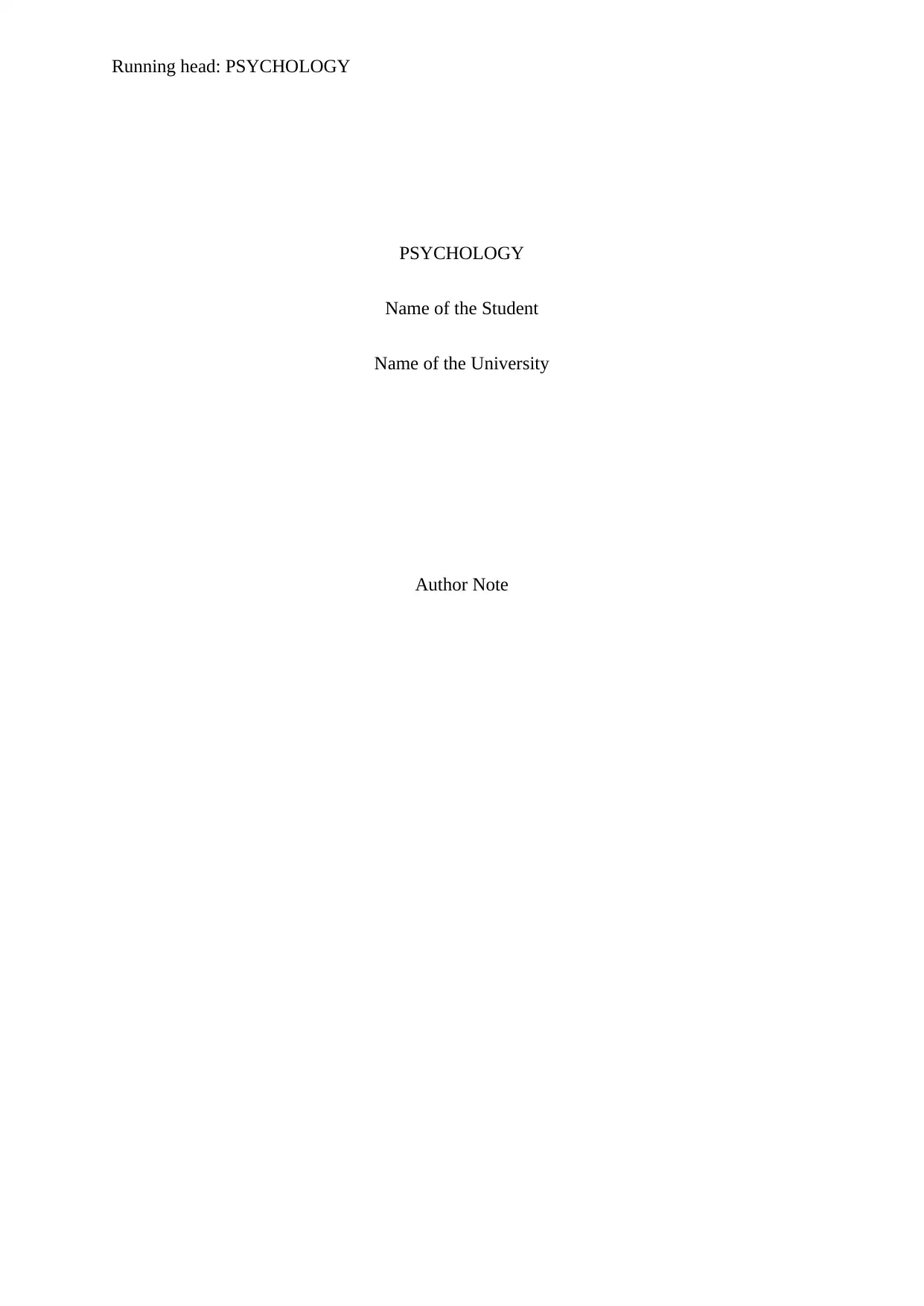
Running head: PSYCHOLOGY
PSYCHOLOGY
Name of the Student
Name of the University
Author Note
PSYCHOLOGY
Name of the Student
Name of the University
Author Note
Paraphrase This Document
Need a fresh take? Get an instant paraphrase of this document with our AI Paraphraser
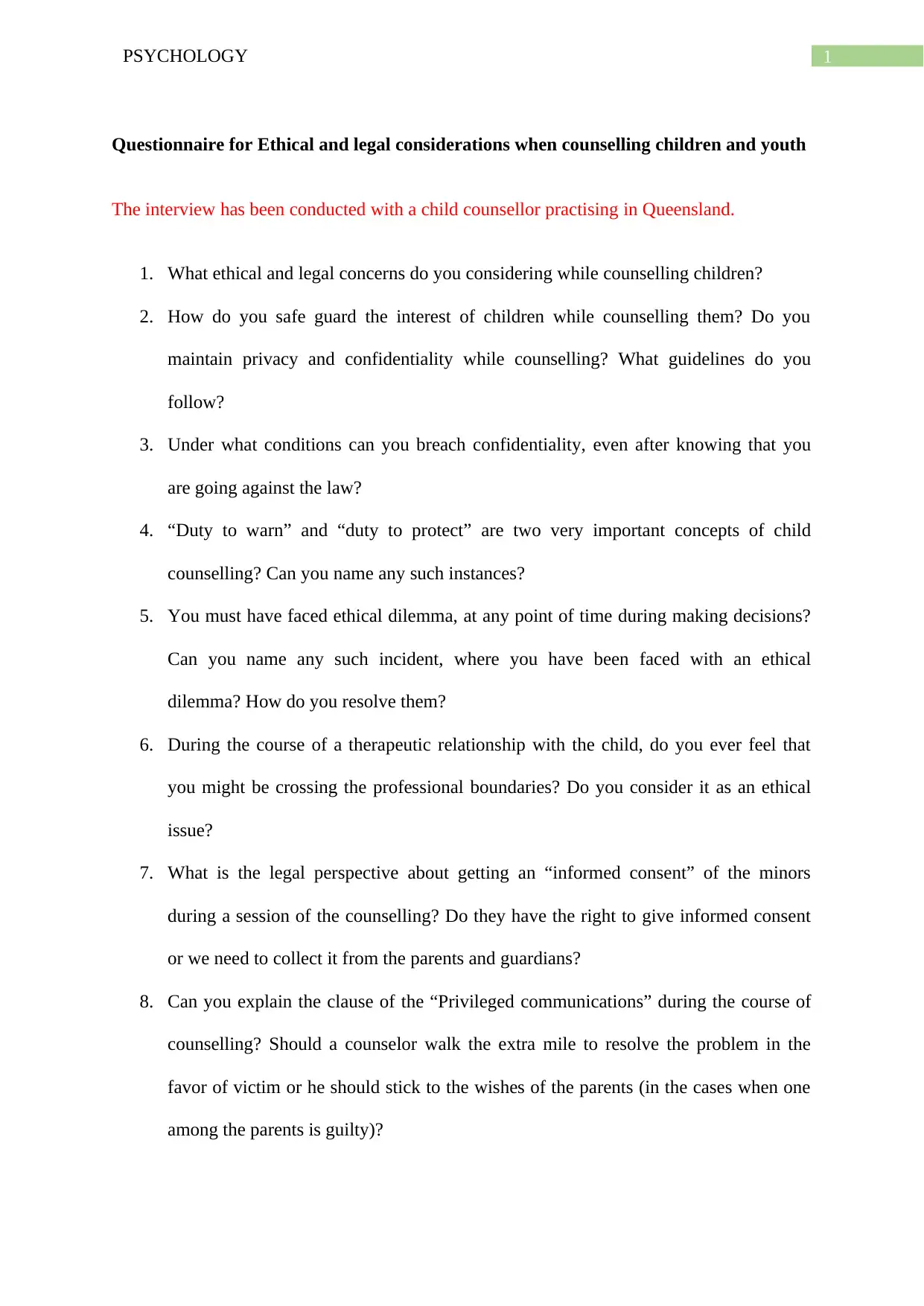
1PSYCHOLOGY
Questionnaire for Ethical and legal considerations when counselling children and youth
The interview has been conducted with a child counsellor practising in Queensland.
1. What ethical and legal concerns do you considering while counselling children?
2. How do you safe guard the interest of children while counselling them? Do you
maintain privacy and confidentiality while counselling? What guidelines do you
follow?
3. Under what conditions can you breach confidentiality, even after knowing that you
are going against the law?
4. “Duty to warn” and “duty to protect” are two very important concepts of child
counselling? Can you name any such instances?
5. You must have faced ethical dilemma, at any point of time during making decisions?
Can you name any such incident, where you have been faced with an ethical
dilemma? How do you resolve them?
6. During the course of a therapeutic relationship with the child, do you ever feel that
you might be crossing the professional boundaries? Do you consider it as an ethical
issue?
7. What is the legal perspective about getting an “informed consent” of the minors
during a session of the counselling? Do they have the right to give informed consent
or we need to collect it from the parents and guardians?
8. Can you explain the clause of the “Privileged communications” during the course of
counselling? Should a counselor walk the extra mile to resolve the problem in the
favor of victim or he should stick to the wishes of the parents (in the cases when one
among the parents is guilty)?
Questionnaire for Ethical and legal considerations when counselling children and youth
The interview has been conducted with a child counsellor practising in Queensland.
1. What ethical and legal concerns do you considering while counselling children?
2. How do you safe guard the interest of children while counselling them? Do you
maintain privacy and confidentiality while counselling? What guidelines do you
follow?
3. Under what conditions can you breach confidentiality, even after knowing that you
are going against the law?
4. “Duty to warn” and “duty to protect” are two very important concepts of child
counselling? Can you name any such instances?
5. You must have faced ethical dilemma, at any point of time during making decisions?
Can you name any such incident, where you have been faced with an ethical
dilemma? How do you resolve them?
6. During the course of a therapeutic relationship with the child, do you ever feel that
you might be crossing the professional boundaries? Do you consider it as an ethical
issue?
7. What is the legal perspective about getting an “informed consent” of the minors
during a session of the counselling? Do they have the right to give informed consent
or we need to collect it from the parents and guardians?
8. Can you explain the clause of the “Privileged communications” during the course of
counselling? Should a counselor walk the extra mile to resolve the problem in the
favor of victim or he should stick to the wishes of the parents (in the cases when one
among the parents is guilty)?
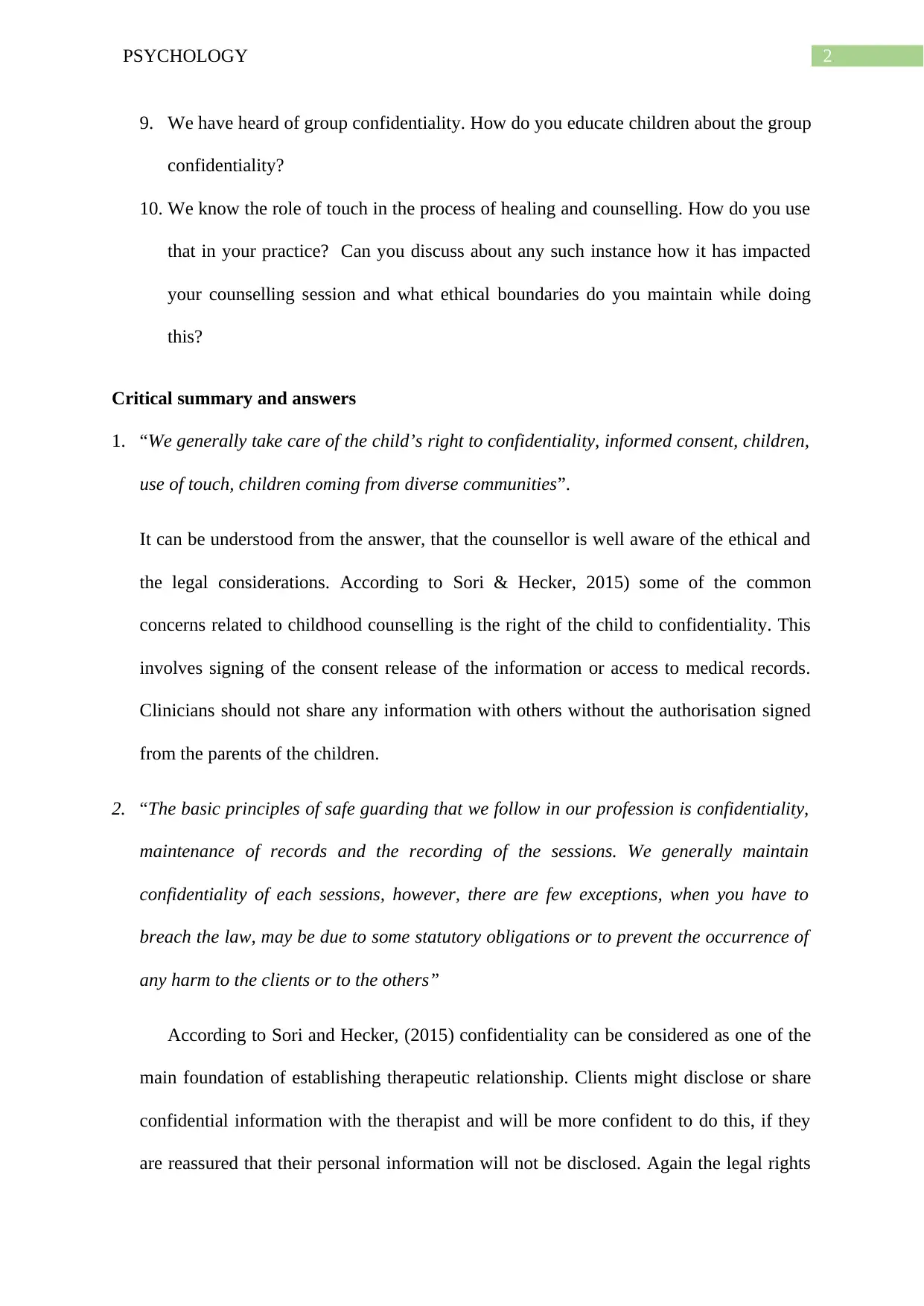
2PSYCHOLOGY
9. We have heard of group confidentiality. How do you educate children about the group
confidentiality?
10. We know the role of touch in the process of healing and counselling. How do you use
that in your practice? Can you discuss about any such instance how it has impacted
your counselling session and what ethical boundaries do you maintain while doing
this?
Critical summary and answers
1. “We generally take care of the child’s right to confidentiality, informed consent, children,
use of touch, children coming from diverse communities”.
It can be understood from the answer, that the counsellor is well aware of the ethical and
the legal considerations. According to Sori & Hecker, 2015) some of the common
concerns related to childhood counselling is the right of the child to confidentiality. This
involves signing of the consent release of the information or access to medical records.
Clinicians should not share any information with others without the authorisation signed
from the parents of the children.
2. “The basic principles of safe guarding that we follow in our profession is confidentiality,
maintenance of records and the recording of the sessions. We generally maintain
confidentiality of each sessions, however, there are few exceptions, when you have to
breach the law, may be due to some statutory obligations or to prevent the occurrence of
any harm to the clients or to the others”
According to Sori and Hecker, (2015) confidentiality can be considered as one of the
main foundation of establishing therapeutic relationship. Clients might disclose or share
confidential information with the therapist and will be more confident to do this, if they
are reassured that their personal information will not be disclosed. Again the legal rights
9. We have heard of group confidentiality. How do you educate children about the group
confidentiality?
10. We know the role of touch in the process of healing and counselling. How do you use
that in your practice? Can you discuss about any such instance how it has impacted
your counselling session and what ethical boundaries do you maintain while doing
this?
Critical summary and answers
1. “We generally take care of the child’s right to confidentiality, informed consent, children,
use of touch, children coming from diverse communities”.
It can be understood from the answer, that the counsellor is well aware of the ethical and
the legal considerations. According to Sori & Hecker, 2015) some of the common
concerns related to childhood counselling is the right of the child to confidentiality. This
involves signing of the consent release of the information or access to medical records.
Clinicians should not share any information with others without the authorisation signed
from the parents of the children.
2. “The basic principles of safe guarding that we follow in our profession is confidentiality,
maintenance of records and the recording of the sessions. We generally maintain
confidentiality of each sessions, however, there are few exceptions, when you have to
breach the law, may be due to some statutory obligations or to prevent the occurrence of
any harm to the clients or to the others”
According to Sori and Hecker, (2015) confidentiality can be considered as one of the
main foundation of establishing therapeutic relationship. Clients might disclose or share
confidential information with the therapist and will be more confident to do this, if they
are reassured that their personal information will not be disclosed. Again the legal rights
⊘ This is a preview!⊘
Do you want full access?
Subscribe today to unlock all pages.

Trusted by 1+ million students worldwide
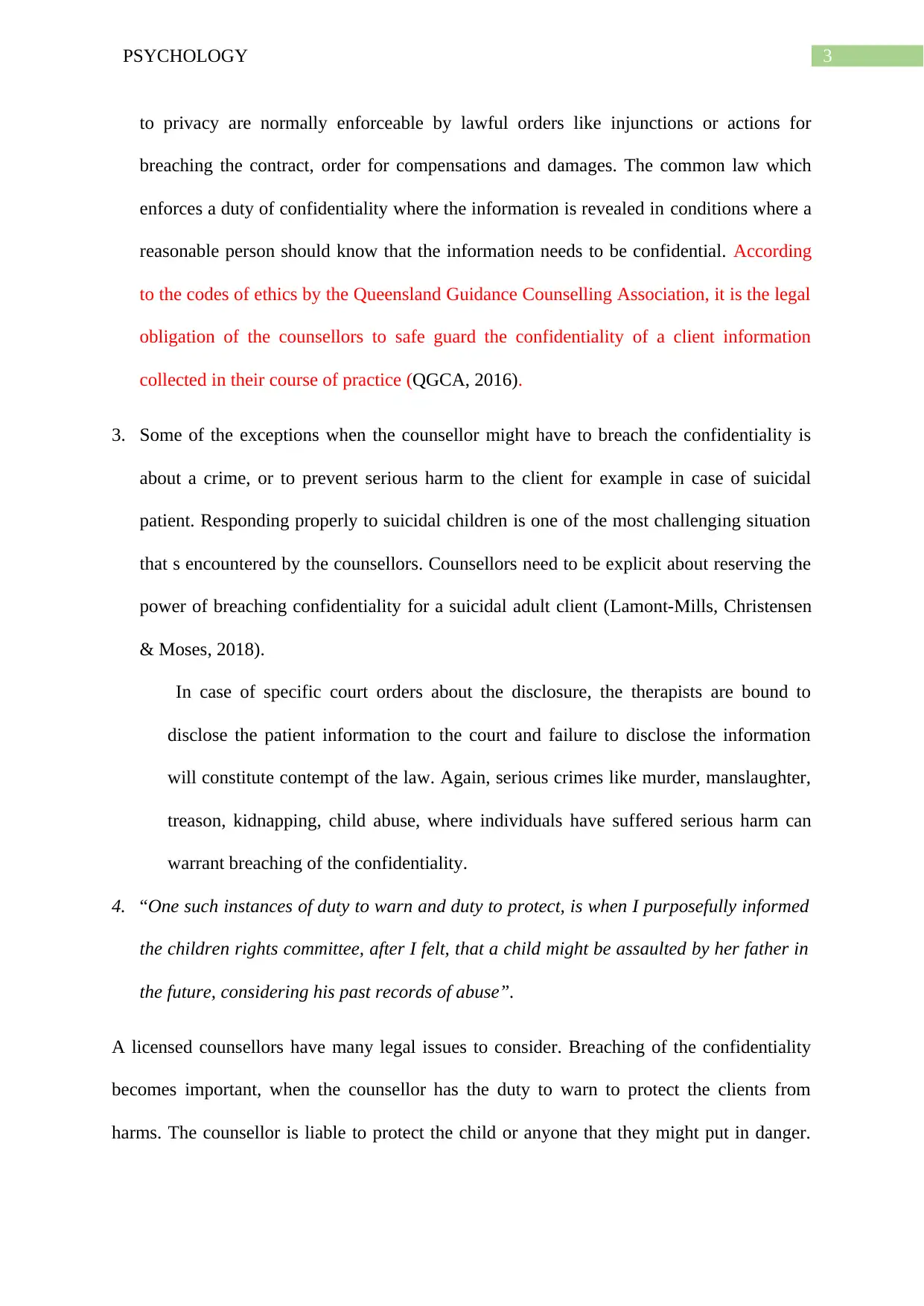
3PSYCHOLOGY
to privacy are normally enforceable by lawful orders like injunctions or actions for
breaching the contract, order for compensations and damages. The common law which
enforces a duty of confidentiality where the information is revealed in conditions where a
reasonable person should know that the information needs to be confidential. According
to the codes of ethics by the Queensland Guidance Counselling Association, it is the legal
obligation of the counsellors to safe guard the confidentiality of a client information
collected in their course of practice (QGCA, 2016).
3. Some of the exceptions when the counsellor might have to breach the confidentiality is
about a crime, or to prevent serious harm to the client for example in case of suicidal
patient. Responding properly to suicidal children is one of the most challenging situation
that s encountered by the counsellors. Counsellors need to be explicit about reserving the
power of breaching confidentiality for a suicidal adult client (Lamont-Mills, Christensen
& Moses, 2018).
In case of specific court orders about the disclosure, the therapists are bound to
disclose the patient information to the court and failure to disclose the information
will constitute contempt of the law. Again, serious crimes like murder, manslaughter,
treason, kidnapping, child abuse, where individuals have suffered serious harm can
warrant breaching of the confidentiality.
4. “One such instances of duty to warn and duty to protect, is when I purposefully informed
the children rights committee, after I felt, that a child might be assaulted by her father in
the future, considering his past records of abuse”.
A licensed counsellors have many legal issues to consider. Breaching of the confidentiality
becomes important, when the counsellor has the duty to warn to protect the clients from
harms. The counsellor is liable to protect the child or anyone that they might put in danger.
to privacy are normally enforceable by lawful orders like injunctions or actions for
breaching the contract, order for compensations and damages. The common law which
enforces a duty of confidentiality where the information is revealed in conditions where a
reasonable person should know that the information needs to be confidential. According
to the codes of ethics by the Queensland Guidance Counselling Association, it is the legal
obligation of the counsellors to safe guard the confidentiality of a client information
collected in their course of practice (QGCA, 2016).
3. Some of the exceptions when the counsellor might have to breach the confidentiality is
about a crime, or to prevent serious harm to the client for example in case of suicidal
patient. Responding properly to suicidal children is one of the most challenging situation
that s encountered by the counsellors. Counsellors need to be explicit about reserving the
power of breaching confidentiality for a suicidal adult client (Lamont-Mills, Christensen
& Moses, 2018).
In case of specific court orders about the disclosure, the therapists are bound to
disclose the patient information to the court and failure to disclose the information
will constitute contempt of the law. Again, serious crimes like murder, manslaughter,
treason, kidnapping, child abuse, where individuals have suffered serious harm can
warrant breaching of the confidentiality.
4. “One such instances of duty to warn and duty to protect, is when I purposefully informed
the children rights committee, after I felt, that a child might be assaulted by her father in
the future, considering his past records of abuse”.
A licensed counsellors have many legal issues to consider. Breaching of the confidentiality
becomes important, when the counsellor has the duty to warn to protect the clients from
harms. The counsellor is liable to protect the child or anyone that they might put in danger.
Paraphrase This Document
Need a fresh take? Get an instant paraphrase of this document with our AI Paraphraser
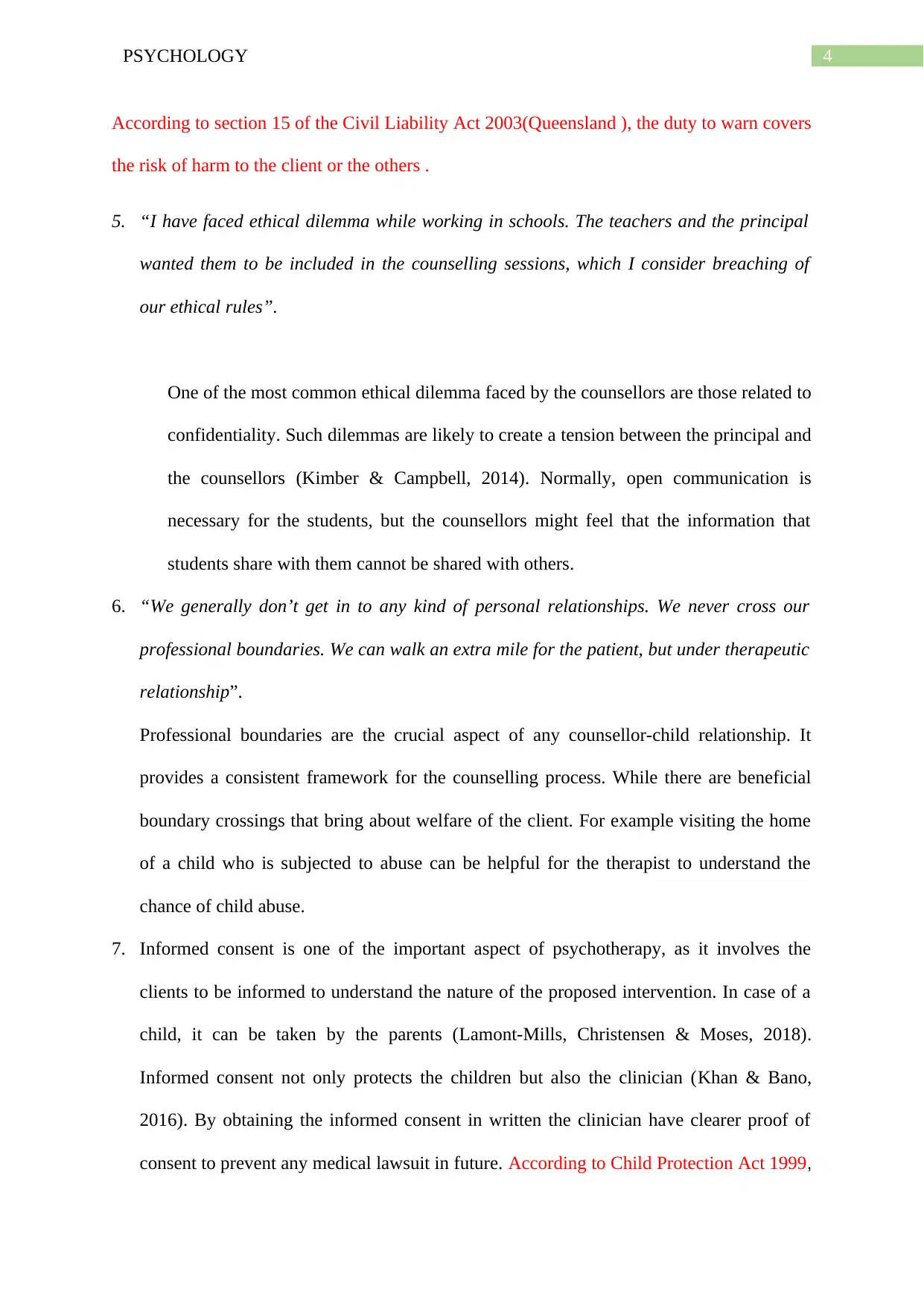
4PSYCHOLOGY
According to section 15 of the Civil Liability Act 2003(Queensland ), the duty to warn covers
the risk of harm to the client or the others .
5. “I have faced ethical dilemma while working in schools. The teachers and the principal
wanted them to be included in the counselling sessions, which I consider breaching of
our ethical rules”.
One of the most common ethical dilemma faced by the counsellors are those related to
confidentiality. Such dilemmas are likely to create a tension between the principal and
the counsellors (Kimber & Campbell, 2014). Normally, open communication is
necessary for the students, but the counsellors might feel that the information that
students share with them cannot be shared with others.
6. “We generally don’t get in to any kind of personal relationships. We never cross our
professional boundaries. We can walk an extra mile for the patient, but under therapeutic
relationship”.
Professional boundaries are the crucial aspect of any counsellor-child relationship. It
provides a consistent framework for the counselling process. While there are beneficial
boundary crossings that bring about welfare of the client. For example visiting the home
of a child who is subjected to abuse can be helpful for the therapist to understand the
chance of child abuse.
7. Informed consent is one of the important aspect of psychotherapy, as it involves the
clients to be informed to understand the nature of the proposed intervention. In case of a
child, it can be taken by the parents (Lamont-Mills, Christensen & Moses, 2018).
Informed consent not only protects the children but also the clinician (Khan & Bano,
2016). By obtaining the informed consent in written the clinician have clearer proof of
consent to prevent any medical lawsuit in future. According to Child Protection Act 1999,
According to section 15 of the Civil Liability Act 2003(Queensland ), the duty to warn covers
the risk of harm to the client or the others .
5. “I have faced ethical dilemma while working in schools. The teachers and the principal
wanted them to be included in the counselling sessions, which I consider breaching of
our ethical rules”.
One of the most common ethical dilemma faced by the counsellors are those related to
confidentiality. Such dilemmas are likely to create a tension between the principal and
the counsellors (Kimber & Campbell, 2014). Normally, open communication is
necessary for the students, but the counsellors might feel that the information that
students share with them cannot be shared with others.
6. “We generally don’t get in to any kind of personal relationships. We never cross our
professional boundaries. We can walk an extra mile for the patient, but under therapeutic
relationship”.
Professional boundaries are the crucial aspect of any counsellor-child relationship. It
provides a consistent framework for the counselling process. While there are beneficial
boundary crossings that bring about welfare of the client. For example visiting the home
of a child who is subjected to abuse can be helpful for the therapist to understand the
chance of child abuse.
7. Informed consent is one of the important aspect of psychotherapy, as it involves the
clients to be informed to understand the nature of the proposed intervention. In case of a
child, it can be taken by the parents (Lamont-Mills, Christensen & Moses, 2018).
Informed consent not only protects the children but also the clinician (Khan & Bano,
2016). By obtaining the informed consent in written the clinician have clearer proof of
consent to prevent any medical lawsuit in future. According to Child Protection Act 1999,
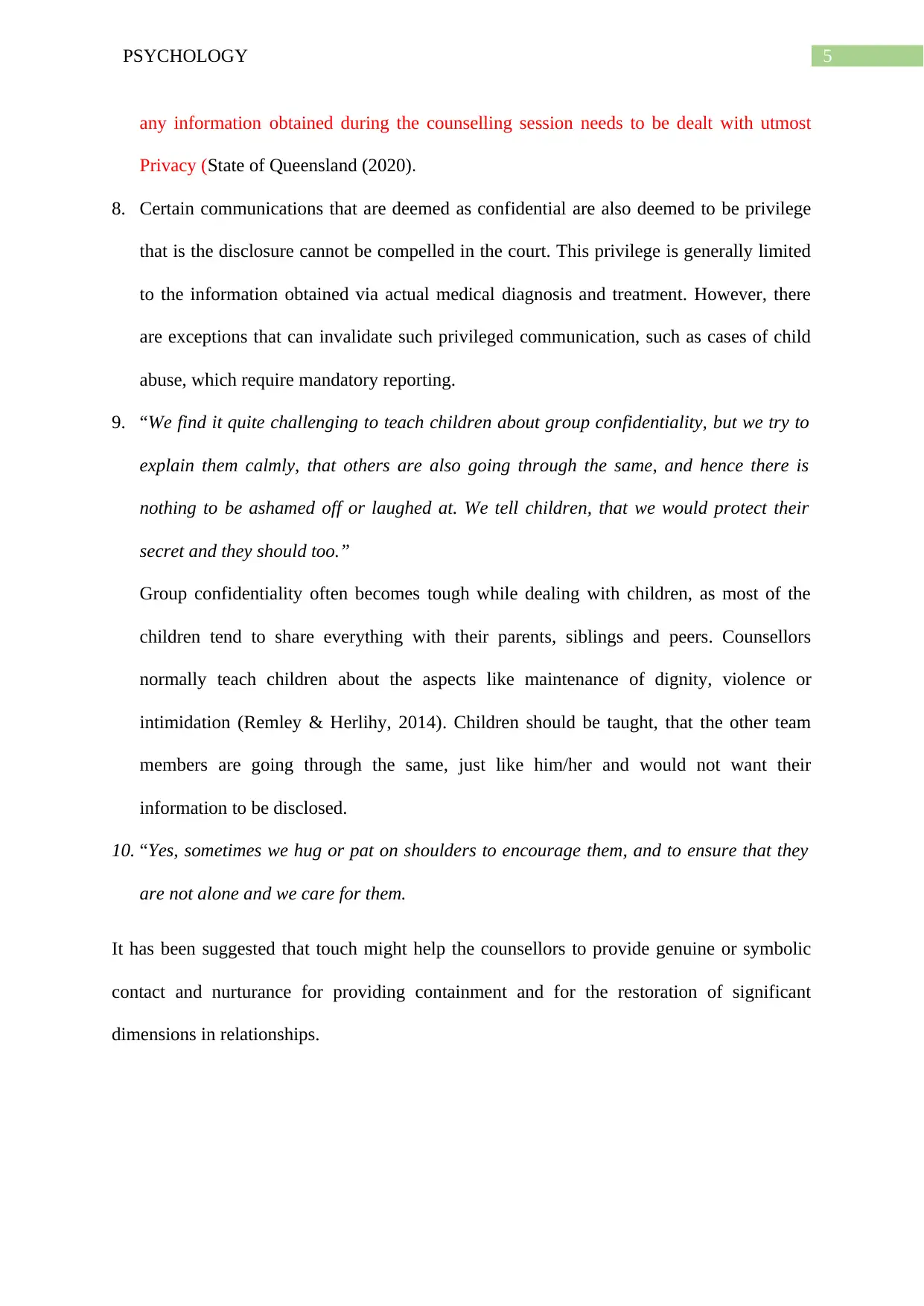
5PSYCHOLOGY
any information obtained during the counselling session needs to be dealt with utmost
Privacy (State of Queensland (2020).
8. Certain communications that are deemed as confidential are also deemed to be privilege
that is the disclosure cannot be compelled in the court. This privilege is generally limited
to the information obtained via actual medical diagnosis and treatment. However, there
are exceptions that can invalidate such privileged communication, such as cases of child
abuse, which require mandatory reporting.
9. “We find it quite challenging to teach children about group confidentiality, but we try to
explain them calmly, that others are also going through the same, and hence there is
nothing to be ashamed off or laughed at. We tell children, that we would protect their
secret and they should too.”
Group confidentiality often becomes tough while dealing with children, as most of the
children tend to share everything with their parents, siblings and peers. Counsellors
normally teach children about the aspects like maintenance of dignity, violence or
intimidation (Remley & Herlihy, 2014). Children should be taught, that the other team
members are going through the same, just like him/her and would not want their
information to be disclosed.
10. “Yes, sometimes we hug or pat on shoulders to encourage them, and to ensure that they
are not alone and we care for them.
It has been suggested that touch might help the counsellors to provide genuine or symbolic
contact and nurturance for providing containment and for the restoration of significant
dimensions in relationships.
any information obtained during the counselling session needs to be dealt with utmost
Privacy (State of Queensland (2020).
8. Certain communications that are deemed as confidential are also deemed to be privilege
that is the disclosure cannot be compelled in the court. This privilege is generally limited
to the information obtained via actual medical diagnosis and treatment. However, there
are exceptions that can invalidate such privileged communication, such as cases of child
abuse, which require mandatory reporting.
9. “We find it quite challenging to teach children about group confidentiality, but we try to
explain them calmly, that others are also going through the same, and hence there is
nothing to be ashamed off or laughed at. We tell children, that we would protect their
secret and they should too.”
Group confidentiality often becomes tough while dealing with children, as most of the
children tend to share everything with their parents, siblings and peers. Counsellors
normally teach children about the aspects like maintenance of dignity, violence or
intimidation (Remley & Herlihy, 2014). Children should be taught, that the other team
members are going through the same, just like him/her and would not want their
information to be disclosed.
10. “Yes, sometimes we hug or pat on shoulders to encourage them, and to ensure that they
are not alone and we care for them.
It has been suggested that touch might help the counsellors to provide genuine or symbolic
contact and nurturance for providing containment and for the restoration of significant
dimensions in relationships.
⊘ This is a preview!⊘
Do you want full access?
Subscribe today to unlock all pages.

Trusted by 1+ million students worldwide
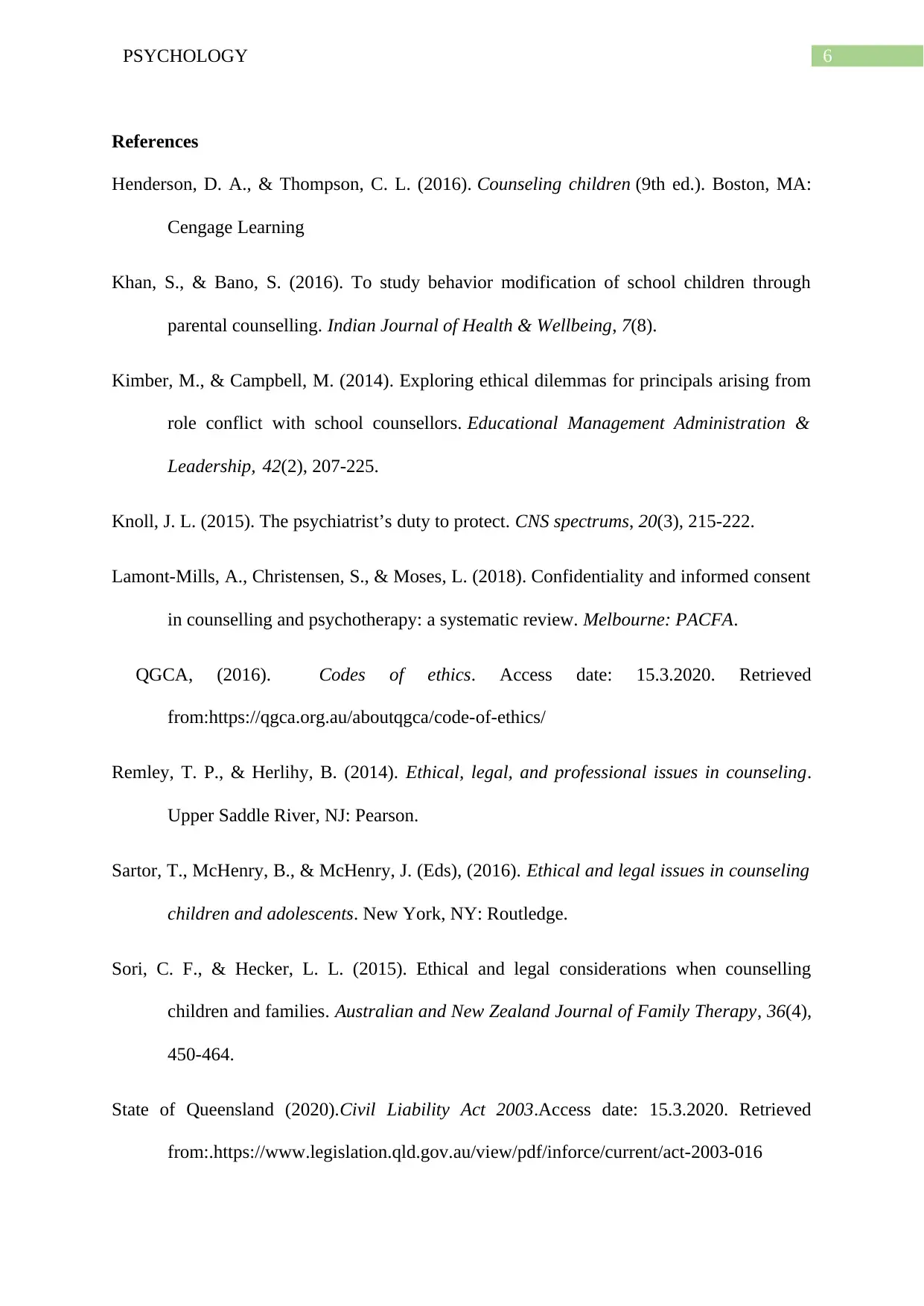
6PSYCHOLOGY
References
Henderson, D. A., & Thompson, C. L. (2016). Counseling children (9th ed.). Boston, MA:
Cengage Learning
Khan, S., & Bano, S. (2016). To study behavior modification of school children through
parental counselling. Indian Journal of Health & Wellbeing, 7(8).
Kimber, M., & Campbell, M. (2014). Exploring ethical dilemmas for principals arising from
role conflict with school counsellors. Educational Management Administration &
Leadership, 42(2), 207-225.
Knoll, J. L. (2015). The psychiatrist’s duty to protect. CNS spectrums, 20(3), 215-222.
Lamont-Mills, A., Christensen, S., & Moses, L. (2018). Confidentiality and informed consent
in counselling and psychotherapy: a systematic review. Melbourne: PACFA.
QGCA, (2016). Codes of ethics. Access date: 15.3.2020. Retrieved
from:https://qgca.org.au/aboutqgca/code-of-ethics/
Remley, T. P., & Herlihy, B. (2014). Ethical, legal, and professional issues in counseling.
Upper Saddle River, NJ: Pearson.
Sartor, T., McHenry, B., & McHenry, J. (Eds), (2016). Ethical and legal issues in counseling
children and adolescents. New York, NY: Routledge.
Sori, C. F., & Hecker, L. L. (2015). Ethical and legal considerations when counselling
children and families. Australian and New Zealand Journal of Family Therapy, 36(4),
450-464.
State of Queensland (2020).Civil Liability Act 2003.Access date: 15.3.2020. Retrieved
from:.https://www.legislation.qld.gov.au/view/pdf/inforce/current/act-2003-016
References
Henderson, D. A., & Thompson, C. L. (2016). Counseling children (9th ed.). Boston, MA:
Cengage Learning
Khan, S., & Bano, S. (2016). To study behavior modification of school children through
parental counselling. Indian Journal of Health & Wellbeing, 7(8).
Kimber, M., & Campbell, M. (2014). Exploring ethical dilemmas for principals arising from
role conflict with school counsellors. Educational Management Administration &
Leadership, 42(2), 207-225.
Knoll, J. L. (2015). The psychiatrist’s duty to protect. CNS spectrums, 20(3), 215-222.
Lamont-Mills, A., Christensen, S., & Moses, L. (2018). Confidentiality and informed consent
in counselling and psychotherapy: a systematic review. Melbourne: PACFA.
QGCA, (2016). Codes of ethics. Access date: 15.3.2020. Retrieved
from:https://qgca.org.au/aboutqgca/code-of-ethics/
Remley, T. P., & Herlihy, B. (2014). Ethical, legal, and professional issues in counseling.
Upper Saddle River, NJ: Pearson.
Sartor, T., McHenry, B., & McHenry, J. (Eds), (2016). Ethical and legal issues in counseling
children and adolescents. New York, NY: Routledge.
Sori, C. F., & Hecker, L. L. (2015). Ethical and legal considerations when counselling
children and families. Australian and New Zealand Journal of Family Therapy, 36(4),
450-464.
State of Queensland (2020).Civil Liability Act 2003.Access date: 15.3.2020. Retrieved
from:.https://www.legislation.qld.gov.au/view/pdf/inforce/current/act-2003-016
1 out of 7
Related Documents
Your All-in-One AI-Powered Toolkit for Academic Success.
+13062052269
info@desklib.com
Available 24*7 on WhatsApp / Email
![[object Object]](/_next/static/media/star-bottom.7253800d.svg)
Unlock your academic potential
Copyright © 2020–2026 A2Z Services. All Rights Reserved. Developed and managed by ZUCOL.




